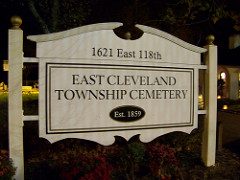East Cleveland, a struggling suburb of Cleveland, has ended up in so much fiscal distress that it is considering allowing Cleveland to annex it as a desperation move. A fascinating article up yesterday on NextCity describes how it got to this point and the various tensions on each side about the merger idea.
On East Cleveland's side there is a proud community loathe to give up autonomy and control (not to mention a mostly-black community, some of whom told NextCity they are afraid of being subject to Cleveland's police force, which is currently under DOJ-mandated retraining as a result of its pattern of excessive use of force). And on Cleveland's side, a none-too-flush city is wondering why it (rather than the state) should bear the financial burden of helping its even more fiscally strapped neighbor, even if it would be nice not to have those issues right outside its borders.
It will be interesting to see where the idea ends up, but the proposal is striking in two ways: first, we may need to rethink our decades of assuming that home rule in the Northeast and Midwest is just too strong to allow us to overcome our fragmented tiny political bodies in favor of regional coordination. Ever since Myron Orfield and David Rusk started beating the “regional” drum, this has been the pushback. “That's great for the West, but here in the Northeast it'll never work.” Never say never?
That's the optimistic angle. But Cleveland's hesitation about the annexation points to the other side of the coin:
To lump all the poor, struggling, disinvested entities together in one jurisdiction while leaving all the well-off municipalities independent, continuing to leech off the jobs, anchor institutions, cultural, and social services of that larger entity without contributing to it does not seem to me to particularly increase regional equity. Even though there might be some benefit to the parties involved if it's done right from efficiencies (and maybe political clout), overall it does not get at the heart of the problem with regional inequity, which is those who can afford it least having to do the most to support the whole.
Last spring at the Lincoln Institute of Land Policy's journalist forum, the mayor of Oklahoma City spoke about his city's amazing turnaround, followed by a searing speech from Sen. Kildee of Flint, Michigan, on the ways his city had been harmed by external forces. Tellingly, to me, it wasn't until the comment period that it came out that along with all the other good stuff Oklahoma City had done up through the mid-1980s, it had also been steadily annexing a huge amount of adjacent land, including wealthy enclaves and productive tax-generating areas. I imagine if we'd asked the mayor if he'd considered annexing only the most impoverished areas on his borders he would have laughed out loud.
Of course in the fragmented Northeast where there's little to “unincorporated land,” entities that are doing fine in our unequal regional dynamics are not going to come looking for, or be excited about, annexation. That's why most recent mergers have been entire-county deals rather than piecemeal, and why places like Minneapolis-St. Paul instituted regional tax sharing as a different way to level things out.
I wonder how East Cleveland would fare today if Greater Cleveland had instituted regional tax sharing when the Twin Cities did.
Photo by Flickr user Elizabethe, CC BY-NC-ND.






“not to mention a mostly-black community afraid of being subject to Cleveland’s police force . . . .”
Any basis for this gratuitous statement? Have you done any reporting from East Cleveland? Spoken to any residents? For years, East Cleveland has been getting by with a police department that is grossly understaffed, under-equipped, and often grossly unprofessional. See, for example:
— A $22 million verdict this year against the E. Cleveland Police Department for locking a man up in a storage closet without food, water or a bathroom for 4 days. https://www.cleveland.com/court-justice/index.ssf/2016/06/east_cleveland_cop_locked_inno.html
— Recent allegations against two E. Cleveland officers for beating and choking a handcuffed suspect. https://fox8.com/2016/08/16/i-thought-they-were-going-to-kill-me-east-cleveland-man-tells-fox-8-i-team-about-alleged-assault-by-police/
My guess is that most East Cleveland residents would prefer the CPD to what they have now.
Hi Greg,
Those are interesting counterpoints. These things are always complicated.
I was referring to a quote from the Rev. Hunter in the original Next City article I linked to: “Hunter says he doesn’t want to lose the East Cleveland police. ‘They are sensitized to their people and neighborhood, more so than Cleveland,’ he says. Cleveland, he notes, has had to pay millions of dollars in settlements to people injured by police, or the families of people killed by them.”
I’m sure he is not alone, but I am also sure other people have differing opinions, especially given your links above.
I’ll try to clarify my wording.
Thanks for the reply. The East Cleveland situation is a mess, and I can sympathize with residents like Rev. Hunter who worry about the loss of community identity that a merger with Cleveland would entail. It’s a little late for that, and attitudes like his are one reason the city has festered for so long. For years, city residents and their representatives have been in denial and refused to confront the issues in a constructive and realistic manner. The recent list of “demands” from its city council is a prime example of this. Unfortunately, you’ll find the same attitude in every other Cleveland suburb.
Thanks for the article! Very interesting stuff. I lived in Mpls for awhile, and their regional identity is much stronger.
One wonders… Does regional identity inspire tax sharing, or does tax sharing inspire regional identity? What would it really take to get NE Ohio as a region to have a greater sense of shared destiny?
As a Cleveland resident, I can attest that several tactics have been employed both at the county and state level to get municipalities to engage in more shared services that transcend city boundaries. It has been successful in some cases for things like police dispatch. And the complete draining of the local government fund by the Kasich administration was a direct attempt to force cities to start sharing services. This forced austerity has only made cities shut down pools during the summer, senior centers, and other services.
However, at the end of the day, too many people are too afraid at the prospects of job loss in the government sector. A discussion between three east Cuyahoga County suburbs to merge (Orange Village, Woodmere, Pepper Pike) was a non-starter. And that was with three well-functioning cities. Cleveland and East Cleveland….total inequitable proposition given the state of affairs in East Cleveland.
However, long-term, it will serve the entire region to lift up East Cleveland. But as was stated previously, it’s going to first require East Cleveland city council to look past themselves and to think about their fellow residents, and the region.